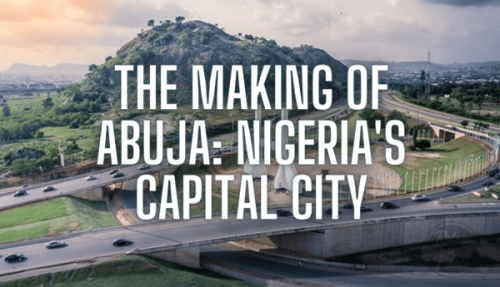The Making of Abuja: Nigeria’s Capital City
Abuja’s establishment as the nation’s capital is one of the most significant decisions in Nigeria’s modern history. National unity and efficient governance were the goals of this strategic move. Here’s how Abuja was conceptualized and developed into the thriving city it is today:.
When Was Abuja Made Nigeria’s Capital?
Historical context and decision
Before Abuja, Lagos was Nigeria’s bustling capital. By the 1970s, Lagos faced severe congestion and infrastructural challenges despite its economic vitality. In 1976, General Murtala Ramat Mohammed’s government decided to relocate the capital to a more strategically located and spacious location. As the country’s geographic center, Abuja was chosen to foster national unity and mitigate ethnic tensions. On December 12, 1991, this new capital officially replaced Lagos.
The vision for Abuja
The blueprint for Abuja was nothing short of visionary. A city with distinct residential, administrative, and commercial zones was designed by International Planning Associates (IPA) to create a modern urban oasis. Nigeria’s diverse population was also encouraged to feel a sense of national identity through green spaces and efficient infrastructure.
Development and challenges
Construction began in the early 1980s, following a phased development plan. Key government buildings, including the Presidential Villa and the National Assembly, were prioritized. This massive relocation effort required substantial financial resources and logistical coordination, involving thousands of civil servants and their families. Despite these challenges, the capital’s official transition occurred under General Ibrahim Babangida’s administration on December 12, 1991.
Abuja Today
Abuja stands today as a symbol of Nigeria’s resilience and ambition. It has rapidly evolved into one of Africa’s fastest-growing cities, with a population exceeding 3.6 million. The city’s skyline features modern skyscrapers, expansive green parks, and well-maintained roads. Managed by the Federal Capital Territory Administration (FCTA), Abuja is a hub for international organizations and embassies, reinforcing its status as a diplomatic center. The city continues to adhere to its original vision, with ongoing projects aimed at enhancing infrastructure and improving quality of life for its residents.
Frequently Asked Questions About Abuja
1. When was Abuja Nigeria’s capital?
Abuja became Nigeria’s capital on December 12, 1991.
2. Why was Abuja chosen as the capital?
Abuja was chosen for its central location, low population density, potential for expansion, and neutrality in ethnic association.
3. What is Abuja’s population?
As of the latest estimates, Abuja has a population of over 3.6 million.
4. What are the main attractions in Abuja?
Main attractions include Aso Rock, Zuma Rock, the Nigerian National Mosque, the Nigerian National Christian Centre, and Millennium Park.
5. What is the climate like in Abuja?
Abuja has a tropical savanna climate, with a rainy season from April to October and a dry season from November to March. Temperatures range from 25 °C to 30 °C (77 °F to 86 °F).
6. How is Abuja’s transportation system?
Abuja has a well-developed transportation system, including major highways, taxis, buses, and a developing light rail system. Nnamdi Azikiwe International Airport serves international and domestic flights.
7. What are some key economic activities in Abuja?
Abuja is a hub for government administration, political activities, international diplomacy, real estate, commerce, and a burgeoning technology sector.
8. Are there educational institutions in Abuja?
Yes, Abuja hosts several notable educational institutions, including the University of Abuja, Nigerian Turkish Nile University, and Baze University.
9. What healthcare facilities are available in Abuja?
Abuja has numerous healthcare facilities, including the National Hospital Abuja and various private clinics and specialist hospitals.
10. Is Abuja safe for residents and visitors?
Abuja is generally considered one of the safest cities in Nigeria, but it is imperative to stay informed about local conditions and take standard safety precautions.
Conclusion
Abuja’s establishment as Nigeria’s capital was a strategic move that significantly benefited the country. It provided a centrally located, well-planned environment for governance and international diplomacy, alleviating Lagos’ pressures. As Abuja continues to grow and evolve, it remains a symbol of Nigeria’s unity, progress, and potential for the future.
Key Takeaways
Strategic Relocation: Abuja was chosen as the capital to promote national unity and reduce ethnic tensions.
Modern Planning: The city was meticulously planned to accommodate Nigeria’s diverse population and foster national cohesion.
Rapid Growth: Abuja is one of Africa’s fastest-growing cities, marked by modern infrastructure and a vibrant economy.
Diplomatic Hub: The city hosts numerous international organizations and embassies, emphasizing its importance as a diplomatic center.
Continued Development: Ongoing projects aim to enhance infrastructure, expand housing, and improve residents’ quality of life.
For more information, visit the Federal Capital Territory Administration’s (FCTA) website.





